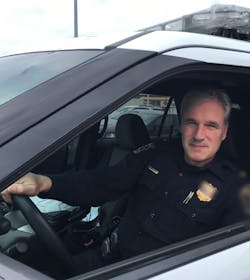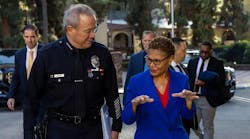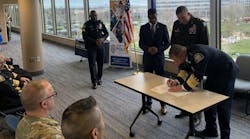Last month I had the privilege of being the keynote speaker for a graduating class of police supervisors who had just completed an intensive course of study on police leadership through a state wide program. It was a special opportunity to address these men and women as they will chart the future direction of policing and it will be through their efforts that our model of service can go from good to excellent. I conveyed to them that the work they just completed should allow them to have a deeper appreciation of an open mind and to look at things differently. They should now have an increased ability to simultaneously see the big picture with the details and understand that we can work within our current structure while still changing our perspective, ourselves and our agencies.
Those traits are critical right now as our law enforcement community continues to experience scrutiny. Sometimes it seems like we are one cell phone video of alleged police misconduct away from a riot somewhere. It will take police leaders like those I spoke with to chart an improved course that builds deeper trust and confidence in our public servants. What is needed is the ability of the server to better understand and value the feelings of the served. This is empathy and the future of policing depends on it. It is why I continually promote an empathetic police model of service which has the potential to bring our profession to its highest level of success and provide the greatest return on our tax dollars.
If one looks up the word empathy, you will find the following related words: clemency, insight, compassion, appreciation, rapport, recognition, comprehension and responsiveness. Each word has an applicability to our customers and allows us to better serve those we encounter during a tour of duty. But there is one other word that is vital within this context and that is balance.
Police work must continually balance and demonstrate appreciation for both the strength aspects of the job such as arrests and physical use of force that are critical with the gentle aspects such as assisting a stranded motorist or finding a missing adult with dementia which a community appreciates. It also requires leadership that encourages officers to approach their work with broader aspirations so they can help maintain or revive a neighborhood instead of just completing specific tasks within it. This model can develop officers who will drive down a street looking for bad guys but also contemplate crime prevention tactics to make the local playground safer for kids.
This approach to policing should never be construed as soft but instead is one that delivers justice without harshness and values the strength of an extended hand of goodwill. When trying to understand empathetic policing, one can look to Officer Larry DePrimo of the New York City Police Department. On November 14, 2012 he bought Jeffrey Hillman who was shoeless at the time a pair of socks and boots using his own money. Officer DePrimo is quoted as saying, “I had two pairs of wool winter socks and combat boots, and I was cold.”
When done well, empathetic policing can actually make an officer safer as well as increase the confidence of those they serve. This is critical in today’s environment where many officers feel under siege and less safe while some segments of society aren’t completely sure that their public servants want to serve them. If embracing this model, when a problem does present itself involving an officer’s alleged mistake, whether real or perceived, the refrains that would be heard may sound more like these: “Not our cops!” or “Even if he did that, that is not the way our police operate and the department will make it right.”
Today’s police leaders have a chance to build on the strong foundations and traditions such as honor, bravery and service that are well ingrained within the police culture and advance the art of policing to the point it can be a model for the world. If up to the challenge, these men and women will find a nation ready for such a paradigm shift.
Northeast Ohio suburban police lieutenant Tom Wetzel is a certified law enforcement executive, adjunct professor in community policing, former SWAT commander and a nationally published author.



